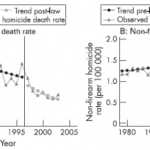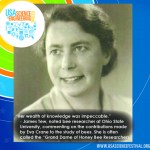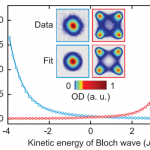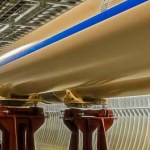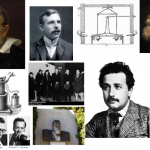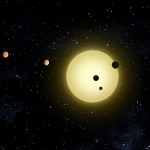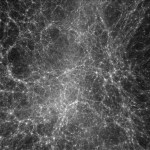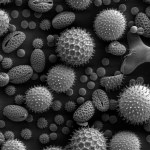Physical Sciences
My quasi-periodic dump of interestingee thingees off the intertoobz
"The Most Precise Extra-Galactic Black-Hole Mass Measurement" A. Gould (ApJ submitted) aka the most talked about paper in astronomy this week...
How to kill your audience - apparently fake Wolverine claws are essential...
Time to Rethink Cosmic Inflation? - and you thought CDM vs MOND was getting out of control ;-)
Will Climate Change Ever Have Its Sandy Hook Moment: Why, Yes, Yes It Will.
Jolly Unpleasant It Will Be Too.
Why don't more girls study physics
Ten Lessons I wish I had been Taught: 1,2,3,4,6,8,9
There's More to…
Yesterday's post about differences between intro physics and chemistry sparked an interesting discussion in comments that I didn't have time to participate in. Sigh. Anyway, a question that came up in there was why we have physicists teach intro physics courses that are primarily designed to serve other departments.
It's a good question, and in my more cynical moments, I sort of suspect it's because engineering faculty are canny enough to outsource the weeding-out of the students who can't hack it in engineering. But I think there are good reasons, particularly at a liberal arts school like…
The Bottleneck Years
by H.E. Taylor
Chapter 26
Table of Contents
Chapter 28
Chapter 27
Eco 550 -- Geoengineering, November 29, 2055
When I was a student, it was not unusual to hear that virtual glasses were going to revolutionize education. Veegees, as they came to be called, were internet connected computers that used the spectacle lens to project information directly into the user-wearer's eyes. The 'virtual' came from the fact the glasses allowed the wearer to manipulate objects only they could see.
What do you tell someone who has the internet group mind mediated by supercomputer…
Have you seen Missourie House Bill 291? Wow, it's pushing intelligent design, um, boldly. Like a gibbon that just sat down in a pool of sriracha sauce in a big tub of feces, that kind of "boldly".
It starts by defining evolution in one paragraph, and by evolution we mean just common descent. It says nothing specific about mechanisms or evidence, and is most concerned that evolution denies "operation of any intelligence, supernatural event, God or theistic figure". And then we get 12 paragraphs defining Intelligent Design, which consist mainly of pointing to biological processes and phenomena…
This post is political. As always, physics readers who don't care about politics are encouraged to skip it. I've got an actual physics post going up tomorrow.
Mark and I have been conducting a debate/discussion over gun control in the United States. For the first round, here's his post and my response. Here's his second round post, and this post is my response.
First, let me summarize where the debate stands. We have four main topics as set forth in Mark's posts: gun violence in "ordinary" crime, gun violence in the context of mass shootings, suggestions for gun control, and miscellaneous…
--Trained as a nuclear physicist, she abandoned that field to travel the world researching the behavior and history of bees
--Established the first worldwide organization for exchanging authoritative research information on bees
Born in Britain in 1912, Eva Crane earned a Ph.D. in nuclear physics but left that field to pursue her fascination with bees and their hives -- a deep interest cultivated after she received a box of bees as a wedding gift in 1942. (Such a present was very much welcome in Britain during those days of World War II to help lessen the short supply of sugar.) Eva…
Recently a number of ScienceBloggers including Mark Hoofnagle of Denialism and myself have written posts about guns and gun control in the United States. While the internet tends to generate more heat than light, we decided that it might be worth having a discussion and debate about the subject. His opening salvo is here, at his blog. I recommend reading it first. He argues that substantial new gun control is both necessary and helpful, and I will generally disagree. As always, I apologize to my physics readers for yielding to the temptation to wax political. I know I dislike it when my…
Last week's post talked about the general idea of negative temperature, with reference to this much-talked-about Science paper (which also comes in a free arxiv version from which the figures used here are taken). I didn't go into the details of how they made a negative temperature gas, though, and as it's both very clever and hard to follow, I figure that deserves a post of its own.
Right, so last time you said that negative temperature just means you're more likely to find fast-moving atoms than slow ones, so all they need to do is whack these atoms in the right way? Right? No, it's more…
Theoretical physicist Raju Venugopalan
We sat down with Brookhaven theoretical physicist Raju Venugopalan for a conversation about “color glass condensate” and the structure of visible matter in the universe.
Q. We've heard a lot recently about a "new form of matter" possibly seen at the Large Hadron Collider (LHC) in Europe — a state of saturated gluons called “color glass condensate.” Brookhaven Lab, and you in particular, have a long history with this idea. Can you tell me a bit about that history?
A. The idea for the color glass condensate arose to help us understand heavy ion…
Homeopathy amuses me. Homeopaths amuse me as well, which is why I'm resurrecting this post. It was originally published elsewhere a few years ago and somehow never crossposted here. So if it seems a bit dated, fear not; Orac hasn't fired up his Tarial cells and managed to go back in time. Now, I realize that lately, due to my work schedule, I've had a tendency to crosspost too much between this blog and my other less "insolent" blogging locale. I know that and plan to try to do much less of it in 2013.
But it's not 2013, and I'm still sort of on vacation.
Besides, I have a very good reason to…
"When you're a little kid you're a bit of everything; scientist, philosopher, artist. Sometimes it seems like growing up is giving these things up one at a time." -Kevin Arnold, The Wonder Years
Like many who grew up around the same time I did, The Wonder Years was one of my favorite shows, putting on display much of the awkwardness, anxiety, hope and powerlessness that comes along with being a pre-teen/teenager in this world. And like many, I had a secret crush on Winnie Cooper, played by Danica McKellar. To accompany this post, with a modern twist, here's the Easy Star All-Stars singing…
We're at that time of year where people publish lists of top stories of the year, but as many crazy people will be happy to remind you, this Friday marks the end of another calendrical period, in the Mayan calendar. So, I'm going to steal an idea from a college classmate on Facebook, who wrote:
When I look back on Baktun 13, I'm going to remember all the wonderful things that happened. What's your best memory from the last 144,000 days?
This seems like a good way to get some more cheerful and science-y content on the front page of the blog. So, without further ado (or very much thought),…
"Death comes to all, but great achievements build a monument which shall endure until the sun grows cold." -Ralph Waldo Emerson
In the great cosmic ocean, there's only one planet that we know -- for certain -- has the right conditions and history to result in intelligent life: our own.
Image credit: NASA, from the Space Shuttle, for Sun-Earth Day 2008.
Life -- or even intelligent life -- may be possible in environments vastly different than our own: around different classes of stars, at different temperatures, and even with different molecules and/or chemical elements.
But we know…
I realize that I've said it many times before, but it bears repeating. Homeopathy is the perfect quackery. The reason that homeopathy is so perfect as a form of quackery is because it is quite literally nothing. On second thought, I suppose that it's not exactly nothing. It is, after all, water or whatever other diluent that homeopaths use (usually ethanol). However, thanks to some basic laws of physics and chemistry and a little thing known as Avagadro's number, any homeopathic dilution greater than 12C (twelve serial 100-fold dilutions) is incredibly unlikely to contain even a single…
"And in the end
The love you take
Is equal to the love you make." -Paul McCartney
Every once in a while, I throw the chance out there (on facebook, twitter, or google+) to ask me whatever questions you want. Yesterday, for some insane reason, I invited people across all three platforms to ask me whatever they liked, with a dual promise that I'd not only answer them, but that the best ones would receive a free "The Year In Space" calendar for 2013, courtesy of the Planetary Society.
Image credit: The Planetary Society.
So I got a ton of questions, and now I'll do my best to answer…
Note: Orac is away somewhere warm recharging his Tarial cells for further science and skepticism. In the meantime, he is rerunning some of his favorite posts. Because it's vacation, he thought he'd rerun a fun post. He needs it; vacation is almost over, and it's back to work on Monday. So, here's one from 2007. I believe I reran it once a few years ago, but it's been at least three years, which means that if you haven't been reading at least that long it's new to you. Besides, it's the post that introduced me to the woo-tastic wonder that it Lionel Milgrom.
While thinking about ways to make…
"If you wish to make an apple pie from scratch, you must first invent the Universe." -Carl Sagan
The Universe is a lot like an extremely intricate cake. We view it today as a snapshot in time, now that it's complete.
Image credit: Blogger user Hilly of http://makesbakesfakes.blogspot.com/.
We can view the whole thing from one point of view, determined by where we happened to be located. But we can also look intricately inside certain sections of it, so long as we have the right tools.
Image credit: Blogger user Hilly of http://makesbakesfakes.blogspot.com/.
But if we truly want to…
"Forget it. I didn't have that thing inside me where I wanted to smash against somebody and watch them break. I was too sensitive for that and disliked being that sensitive." -Josh Brolin
How do you figure out what something is made of? You take it apart -- cracking it open if necessary -- and look inside. This is something we've been doing since... well, since before our ancestors were even human.
Images credit: Elisabetta Visalberghi.
For most things here on Earth, that's easy enough. If you wanted to go down to the smallest scales possible, however, it becomes harder and harder to "crack…
One of the great benefits of having been a blogger for nearly eight years now is that I now have a rich history of thousands of posts. True, there are the occasional posts that I wish I hadn't written and even the occasional post that I consider to be not particularly good, but for the most part I'm proud of my work and would put my blog posts up against nearly anyone else's. Another benefit of having such a long history is that, from time to time, I get the opportunity to revisit really old posts. Having written about these issues for so long, I find it really gratifying when I can revisit a…
A repost:
In a paper that is about to be published in the Bulletin of the American Meteorological Society, researchers Andrew Heymsfield, Patrick Kennedy, Steve Massie, Crl Schmitt, Zhien Wang, Samuel Haimov and Art Rangno make the claim that "The production of holes and channels in altocumulus clouds by two commercial turboprop aircraft is documented for the first time. ... Holes and channels in supercooled altocumulus clouds can be the result of homogeneous ice nucleation induced by turboprop and jet aircraft at temperatures warmer than previously accepted for commercial aviation…
